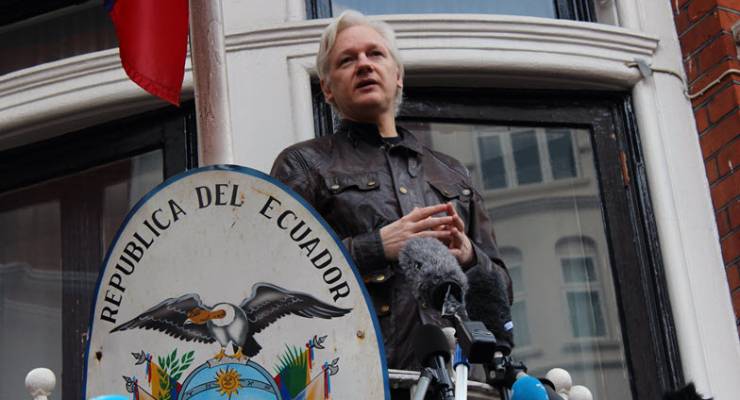
In case you missed it, last week Julian Assange and his decision to remain within the Ecuadorean embassy in London since 2012 was vindicated — entirely so.
Assange and his legal team have always argued that his refusal to leave — even after the dropping of prosecution for sexual offences in Sweden — is because of the threat of the US government seeking to extradite him based on charges relating to WikiLeaks’ release of US government information. So central was this argument to his case that opponents, like Bob Carr, (briefly Australia’s foreign minister under Julia Gillard) tried to dispute it, insisting in the face of extensive evidence that the Americans had no prosecutorial interest in Assange.
Well, now we know, courtesy of a ridiculous stuff-up by US prosecutors in an unrelated case, that there really is a sealed indictment against Assange that is being kept hidden by US authorities. Assange and his lawyers were right.
The specific nature of the charges are unclear. They could relate to the Chelsea Manning materials, which revealed US war crimes, systematic lying and law-breaking. They could relate to WikiLeaks’ publication of Democratic Party materials during the 2016 election campaign. They could relate to its humiliating release of CIA hacking tools, which confirmed the widespread and dangerous US intelligence community practice of refusing to help IT companies plug security flaws in widely used software and hardware.
But any of those charges represent a massive threat to a free press, as even outlets critical of Assange such as The New York Times and The Washington Post, have argued in the wake of the discovery. And they may indicate the Trump administration is prepared to go further than the Obama administration, which waged a relentless war on whistleblowers, in attacking the media. Even a harsh critic of liberal opponents of Trump like Glenn Greenwald has argued the Trump administration would be going beyond its predecessor in prosecuting Assange.
There are many, particularly among progressives, who would regard Assange being prosecuted by the Trump administration as his having reaped the whirlwind. That may even be true. But that doesn’t change the fact that, whatever you may think of Assange personally, he is an Australian being prosecuted for journalism.
It has never been more important to publish material governments want to keep secret, and that means soliciting and encouraging leakers and whistleblowers to come forward with information that exposes — as WikiLeaks has done so often — illegal or corrupt conduct, or provides an insight into the mendacity and cynicism of those who wield power over us.
The fact that the Australian government has said and done nothing about Assange is consistent with the contempt with which this government holds journalists who hold them to account. It complains about them incessantly, tries to get them sacked, cuts the funding of the organisations that employ them.
This failure in relation to Assange was pointed out by Pamela Anderson, a longtime friend of Assange. Scott Morrison’s response to her was the kind of smut that would shame a teenage boy. “I’ve had plenty of mates who’ve asked me if they can be my special envoy to sort the issue out with Pamela Anderson,” he leered.
In this case, we don’t need WikiLeaks to expose and embarrass a government figure unfit for leadership. Morrison did that perfectly adequately himself.








Crikey is committed to hosting lively discussions. Help us keep the conversation useful, interesting and welcoming. We aim to publish comments quickly in the interest of promoting robust conversation, but we’re a small team and we deploy filters to protect against legal risk. Occasionally your comment may be held up while we review, but we’re working as fast as we can to keep the conversation rolling.
The Crikey comment section is members-only content. Please subscribe to leave a comment.
The Crikey comment section is members-only content. Please login to leave a comment.